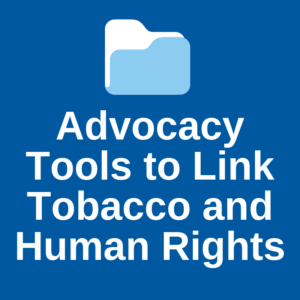Tobacco use is the leading cause of preventable death in the world. A human rights approach to ending tobacco is unique because it implores or requires governments to protect their citizens by implementing tobacco control laws and strategies to end the tobacco epidemic based on legally-binding human rights norms.
[vc_row][vc_column][vc_column_text]Donate
A human rights approach
Smoking negatively impacts the right to life, right to health, right to education, children’s rights, women’s rights, and many others. For example, the tobacco industry often targets their marketing to specific populations based on gender, race, sexual identity and age. Some of these groups smoke at much higher rates than the general population, and they are all protected by various international and regional human rights treaties and instruments. Read more about targeted advertising to women and girls and the LGBT communities.
Which Human Rights are Implicated?
[/vc_column_text][/vc_column][/vc_row][vc_row][vc_column width=”1/2″][vc_column_text]
 Tobacco is the leading cause of preventable death
Tobacco is the leading cause of preventable death
[/vc_column_text][/vc_column][vc_column width=”1/2″][vc_column_text]
 Tobacco use infringes on achieving
Tobacco use infringes on achieving
the “highest attainable standard of health.”
[/vc_column_text][/vc_column][/vc_row][vc_row][vc_column width=”1/2″][vc_column_text]
Tobacco marketing targets children.
[/vc_column_text][/vc_column][vc_column width=”1/2″][vc_column_text]
 Child labor in tobacco production denies educational opportunities. Money spent on tobacco by poor families cannot be spent on education. Lack of pictorial graphic warning labels is a lack of information and education on the product.
Child labor in tobacco production denies educational opportunities. Money spent on tobacco by poor families cannot be spent on education. Lack of pictorial graphic warning labels is a lack of information and education on the product.
[/vc_column_text][/vc_column][/vc_row][vc_row][vc_column width=”1/2″][vc_column_text]
 Tobacco companies use targeted advertising
Tobacco companies use targeted advertising
to normalize smoking in LGBTQI culture.
[/vc_column_text][/vc_column][vc_column width=”1/2″][vc_column_text]
 Cigarettes impact the environment through
Cigarettes impact the environment through
their entire life-cycle, from growing &
manufacturing to second-hand smoke & litter.
[/vc_column_text][/vc_column][/vc_row][vc_row][vc_column width=”1/2″][vc_column_text]
 Tobacco companies use targeted advertising to persuade more women to smoke, and smoking complicates pregnancy. Read more>
Tobacco companies use targeted advertising to persuade more women to smoke, and smoking complicates pregnancy. Read more>
[/vc_column_text][/vc_column][vc_column width=”1/2″][vc_column_text]
 Smoking at work (in bars, restaurants, and casinos) negatively impacts the health of all staff and patrons. Tobacco farmers often get sick from nicotine poisoning or Green Tobacco Sickness.
Smoking at work (in bars, restaurants, and casinos) negatively impacts the health of all staff and patrons. Tobacco farmers often get sick from nicotine poisoning or Green Tobacco Sickness.
[/vc_column_text][/vc_column][/vc_row][vc_row][vc_column width=”1/2″][vc_column_text]
Racial minorities and indigenous people have been heavily targeted by tobacco marketing (for example: 90% of African American smokers use menthol products as a result of targeted advertisements). Read more>
[/vc_column_text][/vc_column][vc_column width=”1/2″][vc_column_text]
[/vc_column_text][/vc_column][/vc_row][vc_row][vc_column][vc_column_text]
ASH’s Accomplishments

ASH has been recognized as a leader in the field of tobacco and human rights. Some of our noteworthy work includes:
- 2019 Bucharest Declaration on Human Rights and a Tobacco-Free Europe, coming out of discussion at our Global Forum that continued at the European Network for Smoking and Tobacco Prevention’s Conference the following days.
- 2019 Global Forum on Human Rights and a Tobacco-Free World, co-hosted by the Romanian Presidency, Romania 2035 Tobacco-Free Generation Initiative, and the European Network for Smoking and Tobacco Prevention with high level speakers such as the European Commissioner on Health and Food Safety and Princess Dina Mired of Jordan.
- 2019 launch of ASH’s Tobacco and Human Rights Hub, a living repository of human rights resources to assist our allies in taking a human rights approach.
- 2018 Cape Town Declaration on Human Rights and a Tobacco-Free World, adopted by the World Conference on Tobacco or Health (WCTOH) and over 100 organizations worldwide, which states, “the manufacture, marketing, and sale of tobacco are incompatible with the human right to health.” See conference photos here.
- A successful campaign to end the Danish Institute of Human Rights’ partnership with Philip Morris International which resulted in DIHR denouncing tobacco as antithetical to the work of a human rights organization. This campaign also resulted in a sign on letter from 123 organizations in 40+ countries calling on Philip Morris International to immediately cease all marketing and production of cigarettes to adhere to human rights norms.
- A presentation before the Inter-American Commission on Human Rights, along with two of our partner organizations. This was the first time the Commission considered tobacco as a human rights issue and was an important victory. Read our press release from the hearing.
- An article in the American Bar Association’s International Law News entitled Tobacco Industry Marketing: A Violation of Human Rights in Latin America. The article was chosen by another ABA Publication, GP Solo Magazine, to be included in a “Best of the ABA” feature issue.
ASH’s Human Rights Program goals include:
- Elevating tobacco as a human rights issue through work with the Human Rights Council, the Framework Convention on Tobacco Control Conference of the Parties (FCTC COP), and other international bodies.
- Using human rights reporting mechanisms to encourage governments to advance tobacco control within their own countries.
- Providing legal resources, training, and support to advocates on how to use human rights norms to advance local tobacco control measures.
- Maintaining a repository of human rights resources to assist our allies in taking a human rights approach. Visit the Resource Hub here.
Connection to other ASH Programs
A human rights approach is deeply ingrained in our other programs of work as well; in fact, our human rights work is a catalyst to speed up the progress of our other programs. Viewing tobacco as a human rights issue will aid in the implementation of the tobacco treaty, the success of our criminal liability program, and in our end goal of no more tobacco deaths. Read more about how all ASH programs intersect.
At ASH, we believe that a human rights approach, encouraging governments to take action to protect their citizens, is an essential catalyst towards a world free from tobacco.[/vc_column_text][/vc_column][/vc_row]

